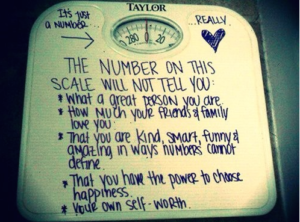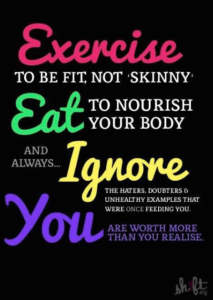If you have a sweet tooth, you know it can be difficult to avoid sugary foods like pastries, candy, or even soda. Which sugary food is your weakness?
Researchers have proven that sugar is a key contributor to weight gain. But how?
Well, sugar is made up of two molecules: glucose and fructose. Glucose is what your body uses for energy. Fructose, on the other hand, is a molecule that your liver turns to fat and is a key contributor to weight gain and disease.
When you eat carbohydrates/sugar, it causes your blood glucose to rise, which can be toxic if it is in large amounts. So your body produces insulin to get the glucose out of your blood and into the cells to be used for energy. Over time, when your body is chronically and your body can actually build a resistance to insulin which means that your pancreas works harder to create the same balance. When the resistance to insulin reaches a critical point, it can result in type II diabetes. But first, your body begins storing an overabundance of fat in your fat cells. The worst part? Not only do you start “gaining weight” but your body has a tough time getting the energy out of the fat cells, which means your brain thinks you are hungry, and you eat even more. What a vicious cycle!
- Excess sugar can lead to cardiovascular disease, type 2 diabetes, and weight gain.
- Eating sugary foods can result in your body storing away more fat.
- Sugar can trick your brain into thinking it’s still hungry (even after you’ve eaten a full meal).
Enter the Ketogenic Diet
The Ketogenic diet is a very strict and significant cutting out of carbohydrates and replaces them with higher amounts of fat and protein. Ketogenic diets have been shown to reverse type II diabetes, changed the lives of those with epilepsy and shows great results for those with Alzheimer’s. The effects of massive reductions in blood sugar have huge implications in all sorts of other health conditions. Some of these conditions are greatly helped by reductions in blood sugar levels:
- cholesterol
- triglycerides
- metabolic syndrome
- stroke
- cardiovascular disease
- syndrome X
- brain injuries
- PCOS (polycystic ovarian syndrome)
- acne
By drastically reducing the carbohydrate intake, the body reduces its production of insulin. Body fat is then highly mobilized for energy production (yay fat burning!). But the key players here are another less well known fuel source – KETONES.
What are KETONES?
Ketones are a metabolite that the brain and body can use as an efficient energy fuel source. Ketones are a type of fuel produced by the liver. Getting the liver to produce ketones is challenging unless you are able to cut out carbs almost entirely. It may take a few days to actually get into ketosis and you have to watch the quantity of protein you are eating as well.
So how do you follow the keto diet?
Ketogenic diets rely on a large intake of fat. Eating fat at every meal is essential. In a typical 2000 calorie per day diet, one might strive for 165 grams of fat, 75 grams of protein and 40 grams of carbohydrates.
OK, OK – stay with me. Eating quality fats is advantageous for many reasons. Once vilified for its supposed negative effects on cardiovascular disease, fats are not all equal. In the ketogenic diet, saturated fats (lard, coconut, palm, butter and cocoa butter) are consumed in high quantities. Unsaturated fats like almonds, walnuts, avocados are all great too. Trans fats like hydrogenated oils are definitely out. These are the ones highly connected with inflammation and disease.
Carbohydrate source like low glycemic vegetables like leafy greens (spinach, chard, etc), broccoli, cauliflower, brussel sprouts, asparagus, pepper, garlic, etc are amazing choices. Fruit is allowed but restricted to low glycemic types like berries and only in small amounts.
Risks associated with Ketogenic Diets
There are some inherent risks with the diet that require you to pay attention to.
Liver and Kidney problems. By consuming large amounts of fat and protein, any existing liver or kidney problems may worsen.
Constipation. Cutting out lots of fibrous foods can shut down your digestion. It’s important to maintain good electrolyte levels. Consider adding salt to drinking water to avoid problems.
Mental Health. Cutting out carbs can can cause ‘fuzzy’ brain and mood swings. While these typically only occur at the beginning, many people report higher levels of mental clarity once they achieve ketosis.
Nutrient Deficiency. Maintaining adequate nutrient intake is paramount to human health. Consuming large levels of a variety of vegetables is critical to maintaining proper nutritional mineral and vitamin levels.
Where do you go from here?
Staying fit and healthy can be challenging, but we’re here for you. How you choose to eat is one of the most important aspects of living a healthy life. When you make good choices about how you eat, how you move, and how you think – you are set up for a healthy life.
Dropping the Winter Weight
If you are looking to lose a few extra pounds this month, you are not alone. Many of our patients are working towards a similar goal.
How you move, eat, and think every day will determine your success. All three are part of maintaining an active lifestyle.
So where does Chiropractic fit in?
Unfortunately, no Chiropractic technique takes off 10 pounds with each adjustment; but people just like you have been able to maintain a healthy weight by adding Chiropractic care into their active lifestyle.
Research has suggested that periodic Chiropractic care can help evaluate, detect and treat emerging problems. So, by reducing injuries, you will be able to stay active and keep your exercise routine on track.
Also, many people report reduced stress after getting adjusted. This makes sense because research studies have shown reduced muscle tension in the body after an adjustment.
And finally, we firmly believe that healthy food choices make a significant impact on your body’s ability to be well and stay well. Eating healthy whole foods and sometimes even using select supplements can give your body the fuel it needs to get through the day.
Join us for our Weight Loss Workshop March 26, 2019 at 6:15PM.
Click here to Register!
 Dr. Craig Hazel’s mission is to help families THRIVE. After graduating from Queen’s University with a Bachelor of Science and a Bachelor of Physical and Health Education, he went on to earn a Doctor of Chiropractic degree and a Bachelor of Science in Anatomy from Parker College of Chiropractic in Dallas Texas. He is passionate about seeing children and families in his private practice at Synergy Chiropractic in Kanata Ontario. A sought after speaker, he has been featured regularly on TSN Team 1200, CTV and RogersTV.He is also the Chairman of the Alliance for Chiropractic of Ontario.
Dr. Craig Hazel’s mission is to help families THRIVE. After graduating from Queen’s University with a Bachelor of Science and a Bachelor of Physical and Health Education, he went on to earn a Doctor of Chiropractic degree and a Bachelor of Science in Anatomy from Parker College of Chiropractic in Dallas Texas. He is passionate about seeing children and families in his private practice at Synergy Chiropractic in Kanata Ontario. A sought after speaker, he has been featured regularly on TSN Team 1200, CTV and RogersTV.He is also the Chairman of the Alliance for Chiropractic of Ontario.








